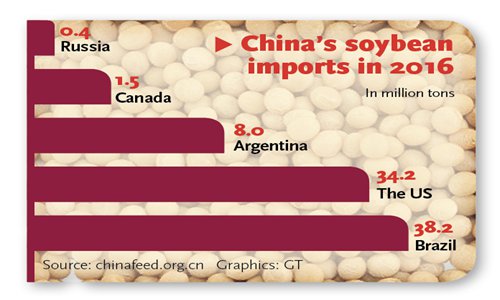
Anti-GMO sentiment, slow approval in China pose challenges
Despite huge increases in its soybean exports to China in recent years, the U.S. is seeking to further expand the volume in a broader effort to boost its agricultural trade with one of the world's largest markets for agricultural products.
But the slow process of gaining regulatory approval for new biotechnology products from Chinese departments and strong public opposition in some quarters in China to genetically modified organisms (GMOs), which include the vast majority of imported soybeans, pose obstacles, experts said on Tuesday.
As an apparent move by the U.S. government to bolster its agricultural exports to China, an agreement under which China is to hold a meeting by the end of this month to conduct a science-based evaluation of eight pending U.S. biotechnology product applications was included in the initial agreements of a Sino-U.S. trade cooperation 100-Day Action Plan released last week.
Among the eight applications, there are two for soybean products, according to Zhang Xiaoping, China country director at the U.S. Soybean Export Council, which represents more than 100 soybean producers and traders in the U.S.
Zhang told a press briefing in Beijing on Tuesday that there might be no changes made to the process for evaluating the eight biotechnology products under the agreement, but by mentioning it in the agreement underscored the need of the U.S. industry for China to complete the safety assessment process as soon as possible after years in the approval waiting list.
China has approved a total of 13 biotechnology products so far, some of which are no longer used because of technology upgrades, and in the last couple of years, three new events have been approved for import for processing, according to Zhang. "China has the world's toughest regulations on GMOs, second to none," he said.
Without the approvals, biotechnology products cannot enter the vast Chinese market, which, in return, delays the commercialization of the technologies and hurts both farmers and consumers, Zhang said.
China is the largest consumer of soybeans. From September 2016 to August 2017, China is estimated to import 89 million metric tons of soybeans accounting for 63 percent of the global total, according to Zhang, citing the U.S. Department of Agriculture.
Behind the officials' reluctance to approve biotechnology products is the strong anti-GMO sentiment in China, with some even calling for boycotts of the products and claims that the products are unsafe. The official position of the Chinese government on GMOs is to allow them, but with caution.
A survey from U.S.-based pollster Nielsen released in September 2016 found 57 percent of respondents in China listed GMOs as one of the most undesirable food ingredients.
But Zhang on Tuesday reiterated that all approved GMOs are safe to consume, he also firmly pushed back claims suggesting GMOs are not safe to consume, calling such suggestions are "ignorant" with no scientific base. He said imported genetically modified soybeans, which are used in mostly feeds, "are not a threat to China's food security, but a guarantee for food security."
He further pointed out that such sentiment has not affected China's imports of U.S. soybeans. "It's been quite smooth. In the last four years, (imports of U.S. soybeans) have been hitting new highs each year."
China imported 34 million tons of soybeans from the U.S. in 2016, up 20.26 percent from the previous year, according to data released by China's General Administration of Customs (GAC) in January.
Zhou Li, a professor at the School of Agricultural Economic and Rural Development at Renmin University of China, said that China's reliance on U.S. soybeans will persist due to low domestic production, which is "impossible to meet the huge demand."
"Unless the anti-GMO sentiment intensifies and reaches a point where it affects the government's decision-making, the imports of soybeans will not decrease," Zhou told the Global Times on Tuesday.
However, the U.S. is facing some tough competition as China also imports the crop from a number of other countries including Brazil, Argentina and Canada, and it continues to explore more suppliers.
In 2016, China imported more than 38 million tons from Brazil, making it the largest supplier, though imports declined 4.67 percent year-on-year. Imports from Argentina and Canada increased 15 percent and 36 percent year-on-year to 8 million tons and 1.5 million tons, respectively, the GAC data showed.


















































